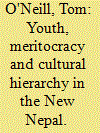| Srl | Item |
| 1 |
ID:
156182


|
|
|
| 2 |
ID:
145704


|
|
|
|
|
| Summary/Abstract |
The use of ethnographic methods is on the rise in International Relations. However, research in this area has largely been constrained to critical or interpretive analysis of nontraditional objects of study. This has been driven in part by two practical problems that limit ethnographic analysis: that of aggregation, as international phenomena are necessarily large in scale, and that of access, as institutional settings are often closed or secretive. While we commend critical and nontraditional research for driving much-needed expansion of the disciplinary agenda, we offer a complementary account, arguing that scholars can also use ethnographic methods in explanatory research. To do so, we draw on two methodological literatures in anthropology. The first approximates ethnographic research through historical immersion. The second applies ethnographic methods at multiple research sites, tracking transnational phenomena across them. The paper sketches prospective studies of each kind, concerning the creation and implementation of the United Nations. While neither method is entirely new to IR, the methodological literatures in question have yet to receive systematic treatment in the field.
|
|
|
|
|
|
|
|
|
|
|
|
|
|
|
|
| 3 |
ID:
173880


|
|
|
|
|
| Summary/Abstract |
The term ‘political ethnography’ has been used to describe a recent trend whereby political scientists, including scholars of security studies and international relations, increasingly deploy fieldwork to explore a variety of political arenas. This article challenges a one-dimensional understanding of political ethnography that sidelines the politics activated in an ethnographic research process and instead calls for political ethnographers to self-reflectively analyse their own positionality in terms of imperial complicity. It discusses experiences of researching counterinsurgency practices in southern Thailand and outlines different dimensions through which counterinsurgents positioned the author as a ‘military mascot’. These include assumptions about the Western and Christian identity of the researcher as well as ideas about the author’s ability to produce objective ‘facts’ in reporting a presumably peaceful military mission. The article concludes by reflecting on the problematic alliance between political science and imperial military projects of counterinsurgency, arguing that the lack of discussion about this affinity constitutes one of the conditions that facilitate the ‘mascotting’ of political ethnographers with military interlocutors.
|
|
|
|
|
|
|
|
|
|
|
|
|
|
|
|
| 4 |
ID:
192299


|
|
|
|
|
| Summary/Abstract |
This paper explores Nepali youth expectations about political equality in the ‘New’ Nepal following the promulgation of a constitution in 2015. It discusses the outcome of seven deliberative youth assemblies held across the country in 2018 and 2019, in which youth debated their priorities for the governments at the local, provincial, and federal levels. These assemblies revealed that youth were committed to a conception of meritocracy that prioritizes individual achievement over cultural ascription as a basis for social and economic justice. Current efforts to introduce equity through ethnic, caste, and gender reservations were seen as useful instruments to achieve this equality but also distrusted as they appeared to contradict meritocratic principles or as tactics to sustain Nepal’s existing cultural barriers.
|
|
|
|
|
|
|
|
|
|
|
|
|
|
|
|